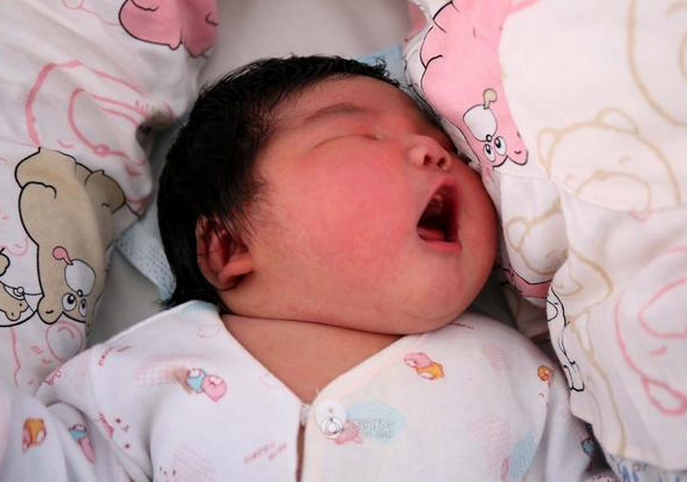Bundle Of Joy: Chinese Woman Delivers Baby Boy Weighing Average Of A 3-Month-Old Via C-Section

The miracle of life usually comes between 37 to 40 weeks of gestation, weighing an average of 5 to 8 pounds. A 34-year-old woman in China, surnamed Tian, got more than she bargained for when she gave birth to a 14-pound baby boy via Cesarean section at the Chongji Maternity Hospital in Yucheng city, Shanxi province. Tian and her big bundle have made national and international headlines, as the newly-born baby weighs about the same as a 3-month-old.
“It’s the first time I’ve delivered such a huge baby in my 30-year career,” the director of Chongji Maternity’s director told Tencent news, the South China Morning Post reported. The hospital staff took pictures posted by Tencent news on QQ.com showing the rosy-cheeked baby drinking from a milk bottle, crying in his incubator, or sleeping soundly next to his mother. The baby is Tian’s second and heaviest child at birth.
Babies that weigh more than 9 pounds and 15 ounces are considered to be much larger than average, and are formally known as macrosomic, literally meaning “of large body.” While there are a number of variables that can contribute to big babies, the most influential include genetics and unmanaged high blood sugar levels from gestational diabetes or diabetes mellitus, according to babycenter.com. Hispanic ethnicity, obesity, gaining a lot of weight during pregnancy, going past your due date, and your baby’s sex male babies are other factors thought to increase the risk for this condition. If a mother has had a large baby, she’s also more likely to have large babies in future pregnancies.
6.3kg giant baby boy born by C-section in N China's Shanxi, weight equal to average 3-month-old pic.twitter.com/0R1gIJyiMO
— China Xinhua News (@XHNews) August 28, 2014Mothers who have large babies, like Tian, are also more likely to have a C-section. Doctors can sometimes find it difficult to determine a baby’s exact size before birth, so C-sections are performed as a “just in case” if the baby is actually of average size. Despite their alarmingly high weight, babies can still be completely healthy. Newborns are expected to lose some weight in the first five to seven days of life, with an average five percent weight loss for normal formula-fed newborns, and a seven to 10 percent loss for a normal breastfed baby, says the American Pregnancy Association.
While 14 pounds is a significant amount of weight for a newborn, the Chinese baby is surprisingly not the world’s largest. The heaviest baby in the world, according to the Guinness World Records website, was Anna Bates born in January 1879 in Ohio, weighing almost 24 pounds. The infant died 11 hours later. In September 1955, an Italian newborn baby born to Sig. Carmelina Fedele in Italy came in weighing about 23 pounds, but he managed to survive.
An ultrasound can help expectant mothers get a more accurate idea of how big their baby really is before birth.



























